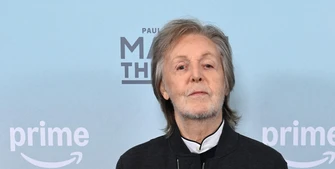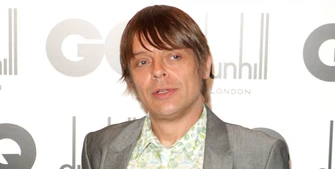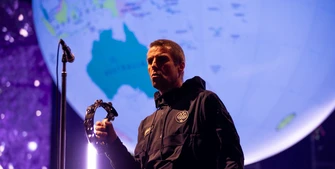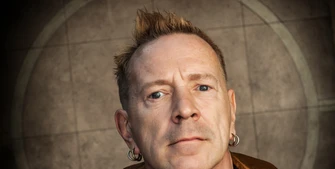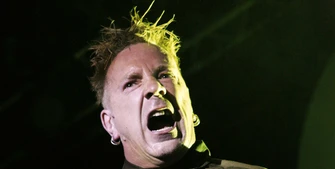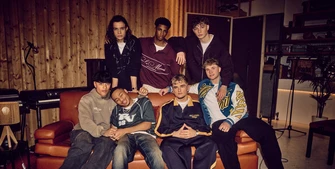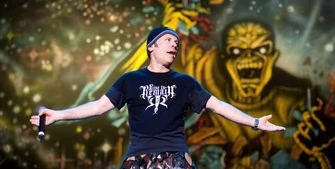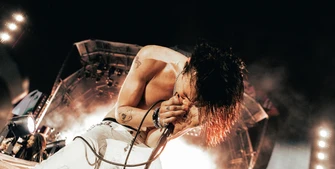Interview: Level 42's Mark King on 40 years of World Machine, AI in music and how Cream influenced his bass playing
You may have heard of Level 42's hit 'Lessons in Love', now discover how his love for music came about, how his milk round float took him to London to land his big music break and his fears over artificial intelligence...
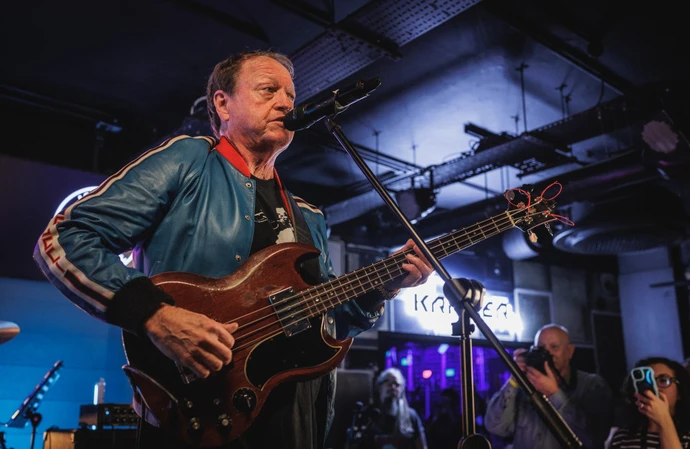
'Starchild'! Mark King, the slap bassist and lead vocalist in iconic '80s group Level 42, fell in love with music after hearing the late Cream bassist and rock icon Jack Bruce.
King doesn't think he would have had a career in music if he hadn't been inspired by Jack - who is regarded as one of the most important and influential bassists of all time - and other greats that have cemented themselves in the industry.
Contact Music caught up with the 66-year-old legend before he performed at the Gibson Garage in London for the 'Jam for Jack' event - a musical tribute for the icon - who talked about the impact Jack had on his career, buying his milk round float to get to London to get his big music break, and his fears about AI...
Why do you think it's important for you to be here tonight?
I don't know that it’s important that I'm here, personally.
I think that any amount of faces would have been happy to come along and help with this.
I think Natasha [Jack's daughter] asked me because the one thing that I share with Jack is that we're both singing bass players.
And, for me personally, Jack was one of my very first influences.
At the age of eight, I heard Cream, and just seeing Jack - I think it’s Jack's voice, more than anything.
Nobody sounded like Jack.
You just think that was such a unique, rare voice, and he was such a talent, and so far ahead of his time because we're talking about - you know, I'm 66 years old now, so at the age of eight, which is 1967/68 to have heard something like Cream and the incredible Jack Bruce.
So, my input on this is because I turned out to be a frontman-singing bass player, and the band that I consequently went on to do, which was Level 42, that was very much the thing.
And so people would draw parallels and say, ‘Oh, you know, it's, you know, Jack Bruce, and what did you think of him?’
So, as an inspiration, I can't think of anybody finer.
And I think that's why Natasha wanted me to be involved and to do it because when it comes to those things, I suppose it's a bit thin on the ground.
Jack Bruce is regarded as one of the most important and influential bass players of all time. When you were in Level 42 with the rest of your bandmates, you were the slap bassist. Did you take some inspiration from Jack?
The inspiration that Jack gave me was the initial falling in love with music and getting involved in music.
And hearing the way that Jack would write songs, and you don't realise this when you're eight years old.
You absorb it. It’s like osmosis, that you just take it in.
And it was very lucky for me, personally, growing up in the UK through the 1960s and then the '70s, and seeing and hearing, more importantly, all of the incredible music that was being made at that time, which Jack was really foundational.
But as a drummer, which I was at the time, I was very interested in Buddy Rich, and so the whole sort of jazz thing came in.
And then there was this band called the Mahavishnu Orchestra, and that was led by John McLaughlin, an incredible guitarist, amazing drummer, Billy Cobham, and Jan Hammer on keyboards, Rick Laird on bass.
And as I started following through from this, of course, this is when things started to sort of join up.
It then turned out that before Mahavishnu Orchestra formed in 1971, John McLaughlin was in a band with Jack Bruce and Tony Williams and Larry Young on organ.
So you start sort of joining, and you go down that rabbit hole, and you just realise that there's such a world of music.
And Jack, say as opposed to Eric [Clapton], Eric kind of took a, I suppose, in a way, a safer route.
And I don't mean this in any way disrespectful at all because we all love Eric's playing and the incredible music that he's made and the legacy that he's left, but it was very different to the route that Jack was taking.
Jack just always followed his own notes.
The idea of experimenting and being experimented with music, is, obviously, sort of coming to fruition now with the foundation that's being formed in his name, which, hopefully, will give young, upcoming musicians, just as I was and hearing Jack, that they'll be able to gain some benefit from the fact that there's a bit of money that will help get them through college.
Like you said with him experimenting with his music, he was quite ahead of his time, wasn’t he?
Oh, most definitely.
The guy was so out there, and there are still things that I hear now that have become fundamental.
I mean, you mentioned earlier how influential Jack was as a player.
There are certain moves that you make as a bass player that really, the first time I can ever remember hearing anything like that was Jack doing it.
There's nothing new under the sun because Jack had obviously been listening to somebody.
But Jack took it his way and went on, just as I got older and went through the '70s.
But because I was a drummer and - I just wanted to play drums, and I never got the chance, so I ended up on bass.
But what I could do was drum on the bass. I used to, like, just thump around on it, which, incidentally, is not what I'm doing today at all.
Because, yeah, I'm keeping it sort of real.
How did you go from doing drums to being a bass player?
It was just really because my best friend at the time, Phil Gould, who was also another drummer, because birds of a feather, you tend to hang out together.
All drummers meet up and talk about how great, you know, the great Billy Cobham - talk about all your favourite drummers.
So we'd get together and hang out. And so when we met up in London back in 1978, hanging out together, Phil was at the Royal Academy of Music, and that's where we met Mike Lindup, who's the keyboard player to this day of Level 42, and Mike was at the Guildhall School of Music, and Mike was doing percussion there.
And so we, the three of us, got together as drummers, birds of a feather, you know, stick together, talking about what sticks they use, and boring stuff, obviously.
But, of course, totally important to you, and engrossing when you're that age.
But Phil had the drum kit, and I didn't have any drums.
So just in order to join in with them, because Mike also could play wonderful keyboards. So he played piano, and Phil played drums, and I just started playing bass.
You grew up in Cowes, Isle of Wright. With the majority of artists, such as The Sex Pistols and Bananarama, they all live in big towns or cities, don't they? As the Isle of Wright is small in comparison, was it challenging to get somewhere like London to get a break?
Most definitely. That was the hardest thing.
I'd known Phil Gould and Boon Gould, his brother Boon, on the island, from the age of about 14/15, we started hanging out.
It’s a small island, isn’t it?
Well, it's big enough. You wouldn’t want to cut the grass on it. It's bigger than you think.
I met Phil and Boon then and, of course, we used to talk about - we're 15 years of age. What were we going to do? We’ve got to get to London, we've got to, we've got to try and get there, because you can't do it from the Isle of Wright.
It's different today. Today, you can actually make a record in your bedroom, you can do it from anywhere at all.
It was quite terrifying.
And to make the break to go from somewhere as sleepy as the Isle of Wight to somewhere as potentially dangerous and challenging as London, took a bit of courage.
How did you pluck up the courage?
I bought my old milk rounds van for 35 quid, and I drove to London in it, and I slept the first full night in the back of the van.
And, for some reason, I decided to do it in February - so it was freezing cold.
I can't stay in the van. And I was like 'The Lady in the Van' - that was me.
I was 18 years old, and I got a job in the music shop, and they didn't sell drums, but I was then able to check out all the wonderful musicians that had come through with the shows.
And doing that, and, you know, through the West End and, and I saw a couple of bass players were doing this thing called slap, and I thought, ‘Oh, that sounds like the guy Larry Graham from Sly and the Family Stone.'
It's one of those things - I've never been one very much for music education.
For me, it's this thing of, you know, you see somebody do something, and it makes sense.
And you think, ‘Oh, yeah, I can do that.’
That's the wonderful thing about, say YouTube now.
All the stuffs on there.
The standard musicianship amongst young musicians is higher now than it's ever been in, certainly, anytime I can remember because it's all there. So young guys can look at all of these incredible musicians playing and see how they do it.
And then, you know, for me, I'm left-handed, naturally, you know, I write left-handed, and I tend to do things left-handed.
My exposure to music was 'Top of the Pops' on a Thursday night.
Everybody played like this. So when I finally got a dram kit at the age of nine, I set it up just like I'd seen on 'Top of the Pops'. For me, it was really hard work trying to play this way, because I should’ve set it up the other way because I’m left-handed.
But it didn't occur to me, because, wow, stupid. And nobody told me, you know.
You travelled to London, at the time, in a bid to get your big break, which, of course, you did with Level 42. What did your parents make of that? Were they really supportive?
My parents were incredibly supportive for all the time.
They bought me drums, they got me a guitar so that I could learn to play a bit of guitar and anything I wanted to do.
My mum, bless her, she spent most of Thursday, Friday, Saturday, Sunday nights, driving out to take me to a gig with the drums in the back of the car because I was way too young.
I started playing in pubs when I was 11 years old, and I was sort of playing three nights a week at the age of 11.
Consequently, my schooling went through the floor, and the teachers used to complain like crazy to mum and dad, saying I never did my homework, and this, that and the other.
But for me, I knew what I was going to do.
I just had this blind faith it would, sort of, work out, and I wasn't aware of just how hard it was going to be to actually do that, not until I got there.
But that's the beauty of being young, you know, the courage of the young.
And fast forward a couple of years; you're in London, Level 42 is formed; you're on 'Top of the Pops' Thursday night, and then to 1985, and that's when 'World Machine' came out. When you and your bandmates were writing and making its tracks, did you ever think that Level 42 could be on to something here, like, it being a global success?
We had our success with other animals.
The third album ['Standing in the Light'] we made with Earth, Wind and Fire in Los Angeles, and that gave us our first top 10 and stuff.
But the difference that 'World Machine' gave us was it, sort of, went exponentially.
We had to have had the five years leading up to that to get us to that stage because we just reached the end of our five year deal with Polydor Records, and if we wanted them to re-sign us, or we wanted to carry on working, we had to somehow expand the audience base because we were managing to sell 60,000 copies of a record per territory when it came out.
And that’s fine, but it had been staying there for like three or four years, and so we had to somehow make a leap.
And we did. We constantly made an effort to write what we thought might be hit songs.
So we came up with 'Something About You', and 'Leaving Me Now', which did the business, and 'Something About You' went top 10 in America, which was great, and that really kicks open such a door for you because everybody's watching what was happening in America, considering that was the door in Japan and the rest of the World. It sort of starts following suit.
And then, we were fortunate enough to get on and come up with the album after now, which is [1987's] 'Running in the Family', and we were able to sort of continue having the hit records.
It's funny because when you talk through it, you say, and then we made another album, but you're talking, you know, 12/14, months had passed from that time to that time.
What would you say the secret to its success was?
I’ve got no idea; I wish I knew.
Do you think the songs connected with people?
I think they did. That particular song was 'Something About You'. It transcended the Brit funk band that we were, and it crossed over into the likes of Taylor Hawkins, the drummer in Foo Fighters.
He called me up and just said, ‘Mark, this is Taylor Hawkins. I love that song. I want to cover it on my album, and I've got other tracks on my album. I'd love you to sing on one. Would you do that?’
And this is a guy from the Foo - this is only 2019 or something, 2018/2019 and you think, ‘Oh my goodness,’ and he just loved the song, and that was the thing.
I’ve had the great pleasure of meeting lots of people, not just musicians, but some real people around the world who said, you know, that track meant a lot to me.
I'm just going through a relationship, or I just lost somebody, or just splitting up, and it’s sort of said everything, and that's the beauty of music.
It can be a real time machine, a capsule and capture the moment.
How did you come up with the name World Machine?
Well, I think Phil was reading the book.
We were also very big fans of science fiction.
We had another track called 'The Machine Stops' that was also from - I don't know if it was a Philip K. Dick book, but it was just the whole idea.
And it was this vibe of there was people living underground, something terrible had happened, everyone was moving, and they were like living underground.
It's almost a bit like being in this room, where all you hear is the chant, the hum of the air conditioning, and the distant hum of the generators.
And then one day it stops, and people start going mad because this thing - it's almost like breathing to me.
They go back, and then they, of course, eventually break out and get to go out onto the surface, anyway.
So that was 'The Machine Stops'. And 'World Machine' was very much of the same. It was just this whole idea of us being in with just a cog, in a machine.
Do you listen to the likes of Taylor Swift, or other present day artists? What do you think of their music?
I can't say I do know much of Taylor Swift's repertoire, so it's not for me to say, yeah, I love it or I don't love it. I don't know any of her material.
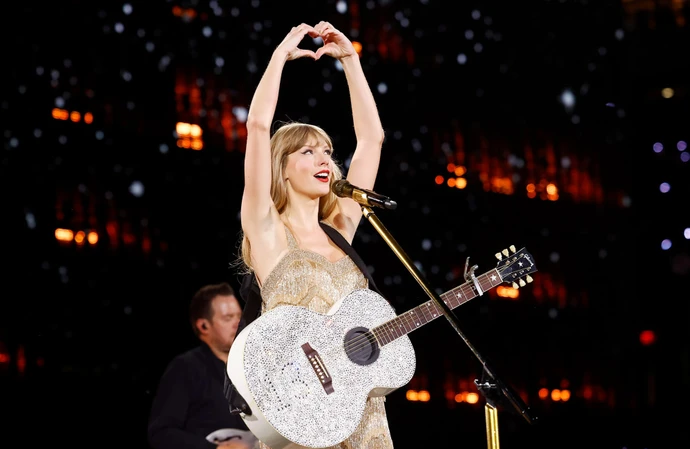
Mark does not know much of Taylor Swift's back catalogue
I don't really know much about Sam Fender, either, other than the fact he comes from Newcastle, and a good friend of mine absolutely loves him. So, you know, that's great.
For me, my contribution musically is in the past.
I've done all that, and I don't think I could sit down and come up with anything worthwhile or anything that was as good as I've done in the past because for me, that was then, there was a real need to do it.
I don't have that anymore. I think I'm ready for that nursing home.
What do you think about artificial intelligence (AI) in the music industry? Some artists may be turning to AI to assist them in writing. Are you in favour of it?
Do you know what, the genie’s out of the bottle, so it's not something you'd be able to put back in.
So, is it a good thing? Is it a bad thing? If it's helpful, it's good. We're all worried about it writing songs for people, and they're singing things.
That's nothing compared to the fact that if it gets too intelligent and decides that, in fact, humans are a waste of space and decides to go all Robocop and kill us all, that's not so good.
That's not a good side of it. I mean, what, what can we do? How does it get controlled? Somebody's going to use it for bad. Somebody's going to use it for good. That's just human nature.
The van that I bought when I worked on the milk round, back then, we used to have an AI guy come around every week.
It was artificial insemination, and that's what he was.
He was a vet, and he used to come around and impregnate the cows so they keep producing milk.
And that's what AI meant to me when I was 17 years of age. Now I'm 66, it means something else.
To celebrate the one-year anniversary of the Gibson Garage London, Gibson hosted a number of special events in-store events including an intimate event in aid of the Jack Bruce Foundation. ‘Jam For Jack’ featured live performances from Mark King, Phil Manzanera, Gary Husband, Jack Bruce’s Big Blues Band, Art Themen, Liam Bailey, Aruba Red, Kyla Simone Bruce, Marlee King and Nandi.
From Thursday, February 20, the public can get up close to an exclusive display of legendary late Cream bassist Jack Bruce’s EB-1 Violin Bass guitar. On show for four weeks, Jack Bruce’s stunning 1950’s Cherry red stain EB-1 Violin Bass will be available to view exclusively only at the Gibson Garage.

